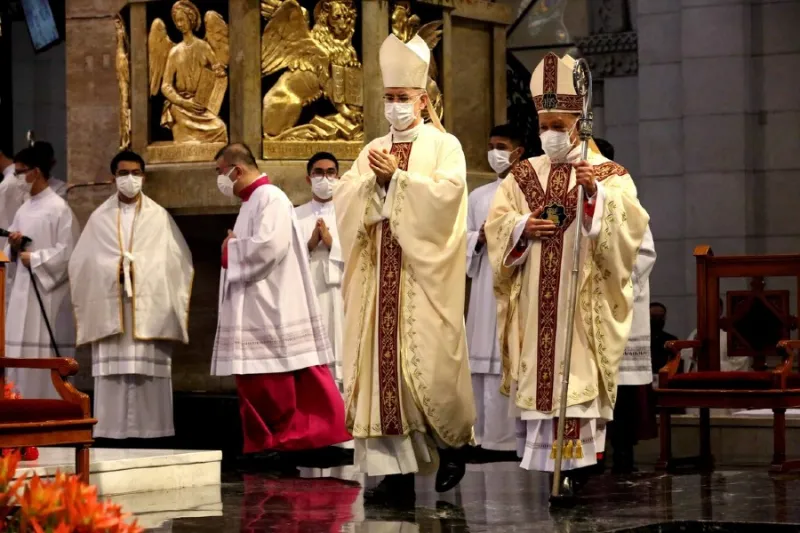.jpg?w=800) Pontificio Sant’Anselmo, Rome / ElijahOwens via Wikimedia (CC BY-SA 4.0)
Pontificio Sant’Anselmo, Rome / ElijahOwens via Wikimedia (CC BY-SA 4.0)
Vatican City, Jul 22, 2021 / 11:10 am (CNA).
The new secretary and undersecretary of the Vatican’s Congregation for Divine Worship both have studied at the Pontificio Ateneo Sant’Anselmo, an institute in Rome whose school of liturgy has had increasing influence in liturgical norms coming from the Vatican.
Created in 1637, disbanded in 1837 and restored by Pope Leo XIII in 1887, the Ateneum’s headquarters have been on the historic Aventino Hill in Rome since 1896. The Pontifical Liturgical Institute of the Pontificio Ateneo Sant’Anselmo was established in 1961 by Pope John XXIII and was entrusted to the Benedictine monks.
The Apostolic See established it as the faculty of Sacred Liturgy of the Pontificio Ateneo Sant’Anselmo; it is located just a few feet away from the Roman Church of Santa Sabina where pontiffs, including Pope Francis, traditionally celebrate Ash Wednesday Mass every year.
Archbishop Piero Marini, the pope’s master of ceremonies for his trips in Italy and a former master of ceremonies for Pope John Paul II, is also a proud alumnus of the institute. Piero Marini is regarded as responsible for the extravagant liturgical vestments that John Paul II was forced to wear during his final years. Upon entering his office, Pope Benedict XVI immediately transferred Marini to the office for Eucharistic Congresses.
Fr. Corrado Maggioni, who has been serving at the Congregation for the Divine Worship and the Discipline of Sacraments since 1990 and is now an undersecretary at the congregation, also studied at Sant’Anselmo.
During the discussions related to the liturgical reform of the Second Vatican Council and its ensuing implementation, the Pontifical Institute became a reference point for every liturgical debate – frequently taking the “progressive” side.
One of the most prominent teachers at the Sant’Anselmo is the theologian Andrea Grillo, a vigorous defender of the recent motu proprio Traditionis custodes which abrogated the liberalization of accessibility to the Ancient Rite Mass made by Benedict XVI.
Among other things, Grillo has campaigned in favor of imposing an institutional silence on the pope emeritus, and attacked repeatedly the four cardinals who presented the dubia about Pope Francis’ apostolic exhortation Amoris Laetitia.
Maggioni and Archbishop Marini were both members of the commission that drafted the motu proprio Magnum Principium of Sep. 3, 2017, where Pope Francis shifted the translations of liturgical texts to the local bishops’ conferences; this ended the Vatican’s policy of producing uniform translations.
Cardinal Robert Sarah, then-prefect of the congregation, was marginalized from those discussions.
When the Vatican officially announced that Pope Francis appointed Bishop Vittorio Viola as secretary of the Congregation for the Divine Worship, and Msgr. Aurelio Garcia Macias as undersecretary, it became evident to insiders that the more liberal Sant’Anselmo Institute had taken control of most liturgical issues.
Observers claim that the Sant’Anselmo alumni and professors are now everywhere. Msgr. Maurizio Barba, an official of the Congregation of the Doctrine of the Faith, teaches there. And so does the Carmelite Friar Giuseppe Midili, who is currently the director of the Rome vicariate’s liturgical office.
Midili is a candidate to succeed Msgr. Guido Marini as the pope’s master of ceremonies. Another candidate for the position is Fr. Pietro Muroni, dean of the Pontifical Urban University’s faculty of theology, and consultant of the Office for the Liturgical Celebrations of the Supreme Pontiff. He studied at the Sant’Anselmo too.
There are exceptions to the views of the institute’s alumni; Msgr. Guido Marini, also an alumnus of the institute, has made a great effort to balance tradition and innovation as Pope Francis’ master of ceremonies.
But the increasing influence of Sant’Anselmo’s positions on liturgical issues has not passed unnoticed among the curia ranks. And some insiders are saying that the institute’s cohort is behind Pope Francis’ motu proprio Traditionis Custodes, which abrogated the liberation of the celebration of Masses according to Pope John XXIII’s 1962 missal.

[…]






.jpg?w=800)